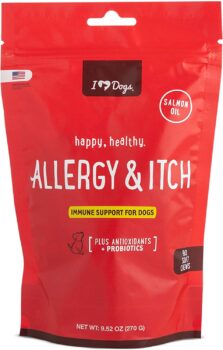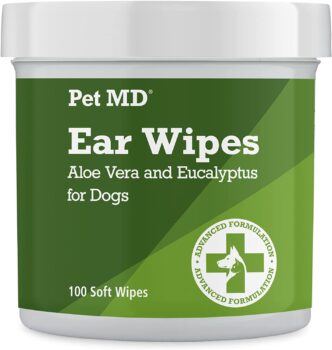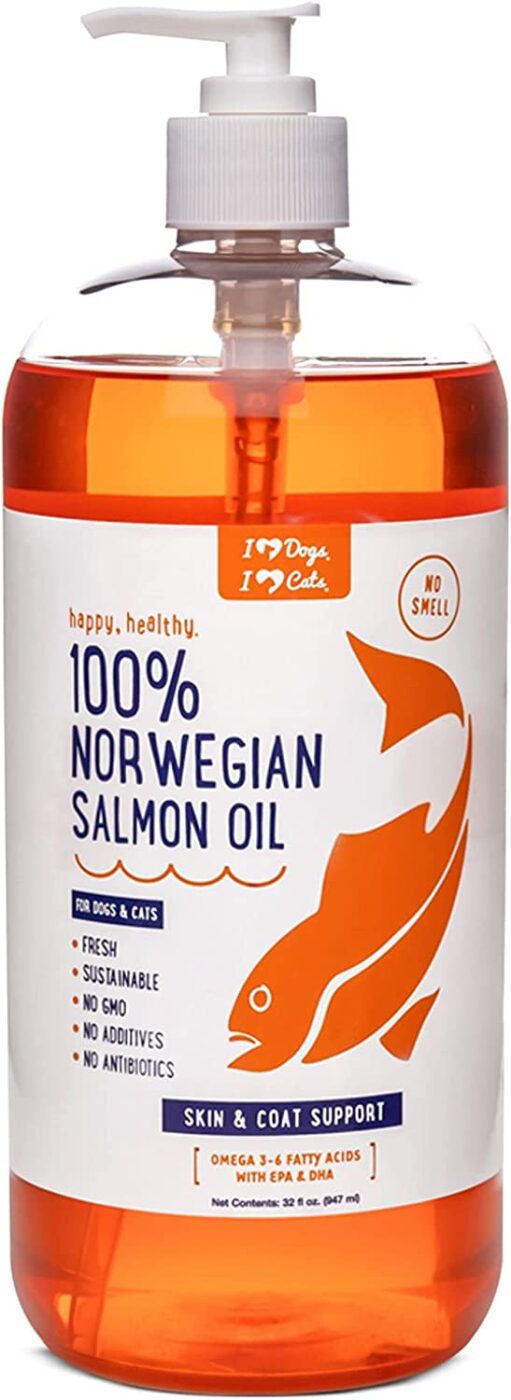Content Writing

Pugs, with their distinctive wrinkly faces and curly tails, are cherished pets worldwide. But these adorable companions are susceptible to certain health issues, including ear infections. In this article, we outline 11 ways to prevent and treat ear infections in pugs, underlining the benefits of Omega-3 fatty acids in their diet.
iHeartDogs is reader supported. Some of the links below may be paid affiliate links, where we receive a small commission on a product at no additional cost to you.
1. Regular Ear Cleaning
A weekly ear cleaning routine can keep ear infections at bay. Be sure to use a vet-approved ear cleaner and never insert anything into the ear canal.
Our favorite ear cleaner is these PetMD brand ear wipes on Amazon.
2. Keeping Ears Dry
Water in the ears can foster bacterial growth, leading to infections. Always ensure your pug's ears are thoroughly dried after baths, swimming, or exposure to rain.
3. Regular Vet Check-ups
Frequent veterinary check-ups can detect ear infections early and provide professional cleaning services. Your vet can offer customized advice for your pug's ear health.
4. Balanced Diet
A balanced diet is crucial for your pug's overall health, boosting their immune system to fight infections. Omega-3 fatty acids, in particular, have significant health benefits.
5. Omega-3 Supplements
Incorporating Omega-3 fatty acids in your pug's diet can help manage allergies, a common trigger for ear infections. These fatty acids have anti-inflammatory properties that can reduce inflammation in the ears.
We're fans of this Norwegian salmon oil on Amazon. It's a bright orangish-pink color and has no fishy smell at all due to its ultra-high purity.
6. Allergen Awareness
Monitor your pug for possible allergies. If they start scratching or shaking their head excessively after exposure to certain foods or environments, they might be allergic. Identifying these allergens can help prevent ear infections.
A few good supplements to help your dog's allergies are apple cider vinegar, quercetin, and colostrum, all of which are found in many natural allergy supplements like this one.
 q
q
7. Topical Treatments
For minor infections, your vet might recommend topical treatments containing hydrocortisone, which can help soothe inflammation and itching. Always consult your vet before starting any new medication.
8. Oral Antibiotics
In severe cases, your vet might prescribe oral antibiotics. It's essential to follow your vet's instructions and complete the entire course of medication to eradicate the infection effectively.
9. Surgery
Chronic or severe infections that don't respond to other treatments might require surgical intervention. Procedures such as Total Ear Canal Ablation (TECA) can provide a permanent solution.
10. Regular Exercise
Physical activity contributes to a strong immune system, crucial for preventing infections. Regular exercise also improves blood circulation, beneficial for ear health.
11. Preventive Medications
If your pug has a history of recurring ear infections, your vet might recommend specific preventive medications.
Below, you'll find answers to frequently asked questions about pugs and ear infections.
FAQs
1. What are the symptoms of ear infections in pugs? Common symptoms include frequent head shaking, scratching, redness, swelling, foul smell, or discharge from the ear.
2. Can pugs suffer from chronic ear infections? Yes, if left untreated or if the underlying cause isn't addressed, ear infections can become chronic in pugs.
3. Are certain pugs more prone to ear infections? Yes, pugs with allergies or those who frequently get their ears wet may be more susceptible to ear infections.
4. How often should I clean my pug's ears? Ideally, you should clean your pug's ears once a week. However, if they swim often or have a history of ear infections, more frequent cleaning may be necessary.
5. What should I avoid when cleaning my pug's ears? Avoid using cotton swabs, which can push debris further into the ear canal. Also, avoid alcohol or vinegar, as these can irritate the ear.
6. Can diet help prevent ear infections in pugs? Absolutely. A balanced diet, particularly one rich in Omega-3 fatty acids, can boost your pug's immune system and reduce the risk of ear infections.
7. How are allergies linked to ear infections? Allergies can cause inflammation and excess wax production in the ear, creating an ideal environment for infections.
8. Can Omega-3 supplements cure ear infections? While Omega-3 supplements can aid in prevention and recovery, they are not a cure for existing infections. They should complement, not replace, a vet's prescribed treatment.
9. When should I consult a vet if I suspect an ear infection? Consult your vet immediately if you suspect an ear infection. Early treatment is key to prevent complications.
10. Is surgery common for ear infections in pugs? Surgery is typically a last resort, usually recommended for severe or recurring infections that do not respond to other treatments.
In conclusion, maintaining your pug's ear health involves regular care and attention. Regular ear cleaning, including Omega-3 in their diet, and routine vet check-ups are key to preventing ear infections. Remember, a healthy pug is a happy pug!









